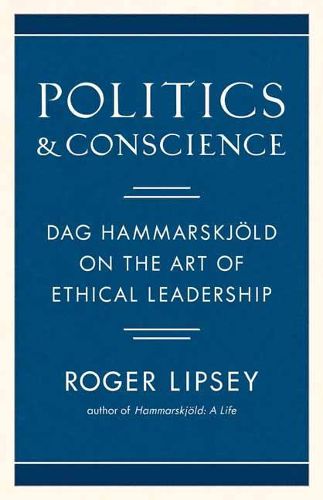Readings Newsletter
Become a Readings Member to make your shopping experience even easier.
Sign in or sign up for free!
You’re not far away from qualifying for FREE standard shipping within Australia
You’ve qualified for FREE standard shipping within Australia
The cart is loading…






An accessible guide to the principles and vision of Dag Hammarskj ld, a man John F. Kennedy called the greatest statesman of our century.
Dag Hammarskj ld served as Secretary-General of the United Nations from 1953 until his tragic death in a suspicious plane crash in 1961. During those years he saw the fledgling international organization through numerous crises with a skillfulness that drew much acclaim. As readers of his now-classic diary, Markings, are aware, Hammarskj ld saw political leadership as an honor calling for humility, moral examination, and spiritual reflection.
In this comprehensive handbook, acclaimed biographer Roger Lipsey details the moral code by which Hammarskj ld lived and made critical decisions. What emerges is a portrait of a man who struck a remarkable balance between patience and action, empathy and reserve, policy and people. Structured through short sections on themes such as values-based leadership, perseverance, and negotiation, Politics and Conscience offers a vision of ethical leadership as relevant today as it was in Hammarskj ld’s time. In our era of zero-sum politics, Lipsey shows politicians and voters alike how Hammarskj ld’s political principles and practical wisdom support the betterment of the common good. It is difficult to hear the low voice of reason, Hammarskj ld wrote, or see the clear little light of decency, but, of course, both endure and both remain perfectly safe guides.
$9.00 standard shipping within Australia
FREE standard shipping within Australia for orders over $100.00
Express & International shipping calculated at checkout
Stock availability can be subject to change without notice. We recommend calling the shop or contacting our online team to check availability of low stock items. Please see our Shopping Online page for more details.
An accessible guide to the principles and vision of Dag Hammarskj ld, a man John F. Kennedy called the greatest statesman of our century.
Dag Hammarskj ld served as Secretary-General of the United Nations from 1953 until his tragic death in a suspicious plane crash in 1961. During those years he saw the fledgling international organization through numerous crises with a skillfulness that drew much acclaim. As readers of his now-classic diary, Markings, are aware, Hammarskj ld saw political leadership as an honor calling for humility, moral examination, and spiritual reflection.
In this comprehensive handbook, acclaimed biographer Roger Lipsey details the moral code by which Hammarskj ld lived and made critical decisions. What emerges is a portrait of a man who struck a remarkable balance between patience and action, empathy and reserve, policy and people. Structured through short sections on themes such as values-based leadership, perseverance, and negotiation, Politics and Conscience offers a vision of ethical leadership as relevant today as it was in Hammarskj ld’s time. In our era of zero-sum politics, Lipsey shows politicians and voters alike how Hammarskj ld’s political principles and practical wisdom support the betterment of the common good. It is difficult to hear the low voice of reason, Hammarskj ld wrote, or see the clear little light of decency, but, of course, both endure and both remain perfectly safe guides.